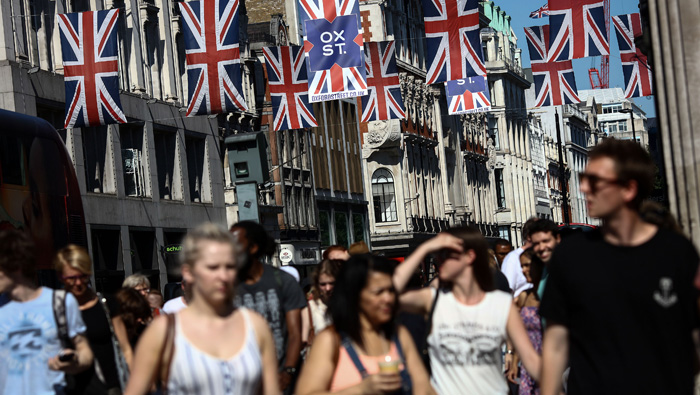
London: A gauge of UK inflation expectations climbed to its highest level of 2016, as the nation’s Brexit decision and a slump in sterling helped push retail prices up in July faster than analysts had forecast.
The 10-year break-even rate, a market measure of expected inflation derived from yield difference between nominal and index-linked gilts, rose to 2.49 per cent, exceeding the yearly high reached last week.
The so-called five-year, five-year forward inflation rate, among indicators monitored by the Bank of England, jumped 0.06 percentage point to 3.13 per cent, compared with its past month’s average of 3.03 per cent.
“The breakdown showed that components that typically respond more quickly to exchange-rate movements, such as petrol and food prices, are already putting some upward pressure on consumer-price inflation,” said Ruth Gregory, an economist at Capital Economics in London.
The gap between RPI, which is used to determined the payments linked to inflation-protected bonds, and the consumer price index, to 1.3 percentage points, matching the highest since 2010.
“In the aftermath of a significant deterioration in the exchange rate following the EU referendum there is an understandable focus on the extent and speed of pass-through to inflation,” said Sam Hill, Royal Bank of Canada’s (RCB) senior economist in London.
First data
Since this is first month of data following the referendum result, “it is a bit too soon to expect to be able to discern an explicit direct impact,” Hill said. “What is more of a theme though in explaining the gradual uptick in inflation is the fading of base effects in fuel prices with the oil price having stabilized.”
Royal Bank of Canada’s Hill said the jump in the RPI-CPI wedge should normalise in coming months, reducing the impact on break-even rates.
Annual retail-price inflation picked up to 1.9 per cent from 1.7 per cent in June, the Office of National Statistics said in London on Tuesday. Economists had forecast that the rate would stay at 1.7 per cent, according to the median estimate in a survey. CPI accelerated to 0.6 percent from 0.5 per cent the previous month.
In consumer prices, input costs surged an annual 4.3 per cent last month, ending 32 consecutive declines, while import prices jumped the most since 2011.
Pound weakness
The pound has dropped about 13 per cent against the dollar since the referendum. Because of that, the Bank of England expects inflation to reach its 2 per cent target faster than previously anticipated, though that didn’t stop it responding to Brexit’s economic threats with new stimulus this month.
The yield on 10-year gilts, which are more sensitive to the inflation outlook than shorter-dated securities, was little changed at 0.53 per cent in London, while the yield on the UK’s 30-year bond fell two basis points, or 0.02 percentage point, to 1.25 per cent.